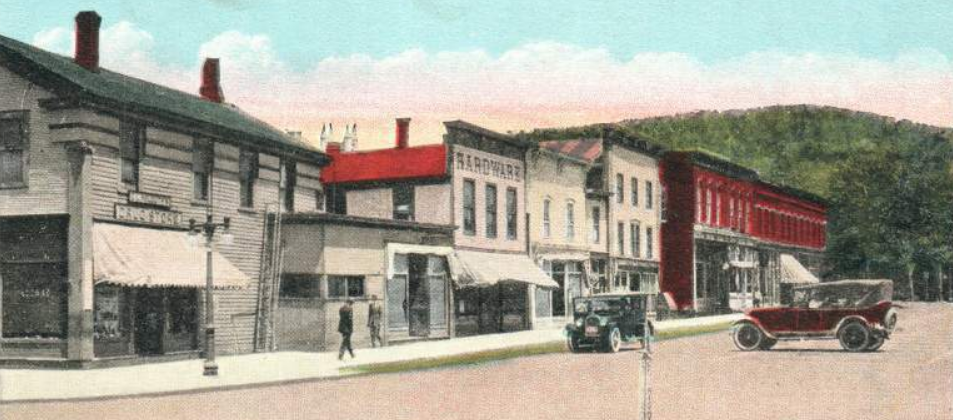History
The town of Little Valley was formed from Perry, now Perrysburgh on April 10, 1818. Conneango and Napoli were taken off in 1823, Mansfield and New Albion, in 1830, and Bucktooth in 1854. It is an interior town, lying a little s.w. of the center of the county.
Its surface is mostly a hilly upland, divided into two principal ridges by the deep valley of Little Valley Creek. The highest summits are 500 - 600 feet above the creek.
Upon Lot 77, in the south east part of the town, is a peculiar rock formation, known as Rock City. Rock City is situated upon the nearly level summit of a hill 400 feet above the valley, and 2,000 feet above sea level and covers an area of 100 acres. The rock, consisting of Catskill conglomerate, is arranged in regular blcks, with sharp angles and perpendicular sides, presenting the appearance of courtyards or squares in the midst of mumerous streets and alleys. It should not be confused, however with the Rock City, located in the Olean area, and a tourist attraction. Little Valley, (p.v.) is located in the northwest corner and, into 1860, contained a church and 36 dwellings. It was an important station on the NY and Erie R.R.
The Town of Bucktooth was formed from Little Valley on November 19, 1854. It is located in the southwestern part of Cattaraugus County. Its surface is a broken and mountainous upland, the highest summits being 800-1000 feet above the valleys. The Allegany River flows west and southwest through the northern part. The principal streams are Red House, Little Valley and Bucktooth Creeks, and Sawmill Run. In 1855, only about 1000 of the town's 47,620 acres were cultivated, the remainder being covered by the forest that provided the main industry (lumbering) for the area.
A few settlements were made prior to 1812, but were abandoned during the war. The first permanent settler was James Rosenbury, who located in town in 1816. Other early settlers included: James Green, Andrew Johnson, and John Boutell. The first child was born to David Hathaway in 1834; and the first marriage was that of Andrew Mills and Sally Hadley.
The first school was taught by Leister Granger in 1834.
Also in 1834, the first inn was opened, by Adam Johnson; and the first
store by John Boardman. A sawmill was built by the Indians, in 1813, on
the Sawmill Run creek.
Bucktooth was formed from Little Valley on Little Valley Creek,
near the center, contains a church and 11 dwellings. It was first
settled, in 1807, by John Green, Judge Benjamin Chamberlin, and several
other families, who
left during the War of 1812 and moved to the Great Valley
area. Other early settlers include: Luther Stewart, William Gilmore,
David Powers, and Alpheus Bascom. After the war, Stephen Crosby, from Madison County,
located on Lot 30, in Feb. 1816; and Noah Culver, Enoch, David and
Alvin Chase, and John Stratton from New England, soon after.
The first sawmill, and gristmill was built by David Powers, in 1809, on Little Valley Creek.
The first church, Free Will Baptist, was formed by Elder Richard M. Cary, October 8, 1826.
Little Valley is now the seat of county government, and the county clerks office is located here.

